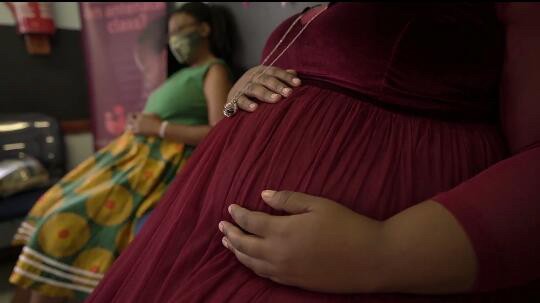A quarter of Worcester’s children are stunted
Mothers who completed high school are much less likely to have stunted children
Screen grab from the CoCare Maternal Support study video shown during a webinar launch of a report by Grow Great and the University of Stellenbosch on child stunting in Worcester.
- In a study of 854 mothers in Worcester, 26% (216) of their children were stunted (of whom 81 were severely stunted).
- Stunting is when a child does not reach their full growth potential.
- Children are less likely to be stunted if their mothers completed high school, the study found.
Children whose mothers don’t finish high school are more likely to be stunted than those whose mothers did complete high school, according to a study conducted by the Grow Great Campaign and Stellenbosch University.
Stunting means a child does not grow to the height they potentially could have. It happens if children don’t get enough nutrition. The World Health Organisation has a technical definition of it: a child is stunted if their height is two or more standard deviations below the median height for their age.
The study, run between July and October 2018, looked at the prevalence and causes of stunting in children under five years in Worcester, Western Cape. It included the responses of 854 mothers between 18 and 50 from Zwelethemba, Riverview, Avian Park and Roodewal.
The mothers were asked questions about their child’s health and nutrition, access to basic services and a child support grant, employment status, and their highest level of education.
Incomplete use of deworming medication and lack of diet diversity were significantly associated with stunting.
More than 60% of the mothers in the study did not complete high school; higher than the national school dropout rate of 40%. The odds that a mother who completed high school had a stunted child was 35% lower than mothers who dropped out.
Speaking at the virtual launch of the report on 13 May, Dr Kopano Matlwa Mabaso of Grow Great Campaign said, “Stunting has long term impacts on cognitive development. It’s associated with education and employment challenges in adulthood, increasing the risk of chronic diseases and cycles of intergenerational poverty.”
Of the children in the study, 26% (216, of whom 81 were severely stunted) suffered from stunting which is a touch higher than the provincial estimate of 23%. The national estimate for stunted children is 27%.
“The prevalence of stunting in our context is worryingly high with little progress being made over the last few decades and prevalence rates that far exceed what would be expected for an upper-middle-income country such as ours, and are far higher than our developing country counterparts,” said Mabaso.
Anna-Marie Müller of Grow Great made the point that stunting has consequences for how a child does educationally, creating a cycle of poverty which that child’s future family is trapped in.
According to the study, mothers who have not completed schooling are consequently denied “the opportunity to participate in the South African formal economy” and to improve their socioeconomic status. This places the child at a greater risk of stunting.
To reduce stunting in children from young mothers, the report recommends that communities invest in improving access to contraception for high school learners, and making sure that learners who do have children get decent child-care so that they can continue going to school while their child is taken care of.
The study also said that the Covid-19 pandemic, with the consequent increase in unemployment and food insecurity, may have worsened nutrition for children under five in Worcester.
“Our hope is that this data will inspire community-level action against stunting,” said Mabaso.
Support independent journalism
Donate using Payfast

Don't miss out on the latest news
We respect your privacy, and promise we won't spam you.
Next: Constitutional Court orders Minister of Police to pay torture victims
Previous: Video: Is this the most disgusting street in South Africa?
© 2021 GroundUp. This article is licensed under a Creative Commons Attribution-NoDerivatives 4.0 International License.
You may republish this article, so long as you credit the authors and GroundUp, and do not change the text. Please include a link back to the original article.
We put an invisible pixel in the article so that we can count traffic to republishers. All analytics tools are solely on our servers. We do not give our logs to any third party. Logs are deleted after two weeks. We do not use any IP address identifying information except to count regional traffic. We are solely interested in counting hits, not tracking users. If you republish, please do not delete the invisible pixel.

